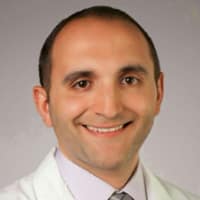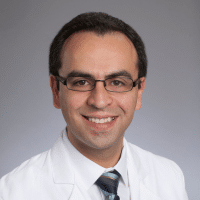Intestinal & Gastrointestinal Care
All-Too-Common Problem
Gastrointestinal disorders can take a serious toll.
60 to 70 million Americans suffer from some gastrointestinal disorder – which refers to any condition or disease in the gastrointestinal (GI) tract, the continuous passage from the mouth to the anus. More than a third of people 65 and older suffer from gastrointestinal problems.
Organs that make up the GI tract are the mouth, esophagus, stomach, small intestine, large intestine, and anus.
Conditions such as constipation, irritable bowel syndrome, hemorrhoids, anal fissures, perianal abscesses, anal fistulas, perianal infections, diverticular diseases, colitis, colon polyps and cancer range in seriousness – but most create significant discomfort that makes it difficult to maintain a routine.
Many of these conditions can be prevented or minimized by maintaining a healthy lifestyle, practicing good bowel habits, and submitting to cancer screening.
Grady’s Gastrointestinal (GI) Center handles all types of gastrointestinal conditions. Though they care for thousands of patients each year, our GI team specializes in meeting each patient’s unique needs. Our goal is to restore normal routines as quickly as possible.
Why Choose Us
The Grady GI Center brings together experienced academic and clinical professionals to prevent, diagnose, and treat disorders of the gastrointestinal system.
Our multidisciplinary team includes gastroenterologists, interventional endoscopists, colorectal surgeons, hepatologists (specialists in the liver), and dietitians. They work with patients to treat their conditions and control the symptoms that affect their health and lifestyles.
The center has unparalleled experience in the treatment of high acuity patients, but we care for everyone. Our digestive disease services encompass general GI, therapeutic GI, colorectal surgery, surgical oncology, hepatobiliary surgery that involves the liver, gallbladder, bile ducts, or bile, and minimally invasive surgery.
We are only one of a handful of U.S. hospitals staffed by multidisciplinary GI specialists from two medical schools. Our physicians are faculty members of Emory and Morehouse university medical schools. They use Atlanta’s newest medical technology to diagnose and care for patients. And, because Grady has one of the region’s most active medical research programs, we offer access to some of medicine’s most promising emerging therapies.
Because GI disorders are often accompanied by other health concerns, Grady offers one more advantage: We’ve spent more than 125 years building the most comprehensive medical services in Atlanta, to deliver the best care possible.
What We Treat
The Grady GI Center treats an array of GI disorders, including functional disorders are those in which the gastrointestinal (GI) tract looks normal but doesn’t work properly, and structural disorders in which the bowel looks abnormal and doesn’t work properly. Sometimes, the structural abnormality needs to be removed surgically.
Common functional conditions we treat include
Achalasia is a rare disorder of the esophagus that makes it difficult to swallow solids and liquids. The condition may be accompanied by heartburn and chest pain.
Learn more about achalasia here.
Constipation means it is hard to have a bowel movement. It is usually caused by inadequate “roughage” or fiber in the diet, or a disruption of the regular routine or diet.
Learn more about constipation here.
IBS, also called spastic colon, irritable colon, or nervous stomach, is a condition in which the colon muscle contracts more often than normal. It may be triggered by certain foods, medicines, and emotional stress.
Learn more about irritable bowl syndrome here.
Common structural conditions we treat include:
These are splits or cracks in the lining of the anal opening. The crack exposes underlying muscles that control the passage of stool through the anus. An anal fissure is painful, and can lead to bleeding or spasm after bowel movements.
Learn more about anal fissures here.
These abscesses can occur when the small anal glands in the anus become blocked, and bacteria present in the glands cause an infection. When pus develops, an abscess forms.
A fistula often follows drainage of an perianal abscess. It is an unusual passageway from the anal canal to a hole in the skin. Body wastes traveling through the anal canal are diverted through this channel, causing itching, irritation, pain, and bleeding. They usually need surgery.
Learn more about anal fistulas here.
Several types of colitis, conditions that cause an inflammation of the bowel, include infectious colitis, ulcerative colitis, Crohn’s disease, ischemic colitis, and radiation colitis. Colitis causes diarrhea, bleeding, and stomach cramps.
Learn more about colitis here.
Each year 130,000 Americans are diagnosed with colorectal cancer. Thanks to early detection and treatment, colorectal cancer is one of the most curable forms of the disease. By using a variety of screening tests, it is possible to prevent, detect, and treat the disease long before symptoms appear.
Learn more about colon cancer screenings here.
Diverticulosis is the presence of small pouches in the muscular wall of the large intestine that form in the bowel. They usually occur in the sigmoid colon, the high-pressure area of the lower large intestine. It is often caused by too little roughage (fiber) in the diet.
Learn more about diverticular disease here.
The most common esophageal disorder is gastrointestinal reflux disease (GERD), a kind of severe form of heartburn that can develop into more serious conditions, including cancer. Other esophageal disorders include strictures and swallowing issues.
Learn more about GERD here.
The most common gallbladder diseases are gallstones, hard deposits that form in the gallbladder’s fluid; cholecystitis, an inflammation of the gallbladder, and cholestasis, any condition that stops or slows the flow of bile from the liver.
Learn more about gallstones here.
Hemorrhoids are swollen blood vessels along the anal opening, caused by chronic pressure from straining during a bowel movement, persistent diarrhea, or pregnancy.
Learn more about hemorrhoids here.
The most common diseases that cause the liver to malfunction include hepatitis A, hepatitis B, and hepatitis C, all infections caused by a virus; cirrhosis, chronic liver damage caused by a variety of things; hemochromatosis, an inherited condition that leads to high iron levels in the blood, and stones or form in the bile duct.
Learn more about liver disease here.
Hereditary pancreatitis is a progressive disease with a high risk of permanent problems. Patients typically have chronic pain, diarrhea, malnutrition, or diabetes.
Learn more about pancreatitis here.
Small bowel disorders can include GERD and other conditions. Symptoms typically include bleeding.
A variety of issues ranging from GERD to cysts can cause chronic pain, nausea, and vomiting.
Learn more about ulcers here.
Make an Appointment
Call (404) 616-1000, Monday-Friday, from 6 a.m. to 11 p.m. to schedule your appointment.
If you are an existing Grady patient and have a MyChart account, visit MyChart to request your appointment online.
Locations and Directions
-
Correll Pavilion
80 Gilmer St. SE
Atlanta, GA 303036th FloorMonday - Friday: 8 AM - 4:30 PM -
Camp Creek Comprehensive Care Center
3896 Princeton Lakes Way
Atlanta, GA 30331Monday - Friday: 7 AM - 5 PM
Our Services
Grady GI Center performs a wide variety of procedures. Some of the most common include:
To treat painful swallowing swallow tests are conducted to properly diagnose the cause of the problem.
This procedure uses an endoscope to examine the interior of a hollow organ or cavity of the body. Endoscopes are inserted directly into the organ. For example, an ERCP is a procedure that enables physicians to examine the pancreatic and bile ducts. An ERCT is used to diagnose diseases of the gallbladder, biliary system, pancreas, and liver. Pillcams are used to diagnose issues in the small bowel.
This is an endoscopic examination of the large bowel and the distal part of the small bowel with a tiny camera attached to a flexible tube passed through the anus.
To learn more about colonoscopy and bowel prep, visit gradyhealth.org/get-ready-for-your-colonoscopy
The center typically prefers to use robotic laparoscopic surgery to correct structural issues in the GI tract because it is minimally invasive and results in quicker healing and recovery and shorter hospital stays. Colorectal surgery deals with disorders of the rectum, anus, and colon. Occasionally, open or traditional surgery is required.
Research
Research conducted by Grady’s GI Center has helped to transform the treatment of jaw fractures around the world. The center’s surgeons are involved in a variety of studies research the treatment of facial trauma and routinely their work is published in prestigious journals.
Our Doctors
Every hospital treats patients. At Grady, we strive to treat them better, more efficiently, and more effectively. Our mission to care for all who need us attracts physicians from across the nation. They are drawn here by the knowledge that we test the limits of medicine by innovating existing standards of care, researching cutting-edge drugs and therapies, and exploring novel treatments.
Our zeal for innovation has given Grady a national reputation for medical advancement in conditions cared for by specialists in our centers of excellence. Access to all of these accredited practices is available to every Grady patient and our collegial environment means that specialists routinely help to care for their colleagues’ patients.
Our surgeons, who serve on the faculties of Emory and Morehouse medical schools, are drawn by Grady’s reputation and mission.
Internal Medicine
Gastroenterology
Gastroenterology
Chief of Gastroenterology
Gastroenterology, Internal Medicine
Gastroenterology
Gastroenterology, Internal Medicine
Gastroenterology








